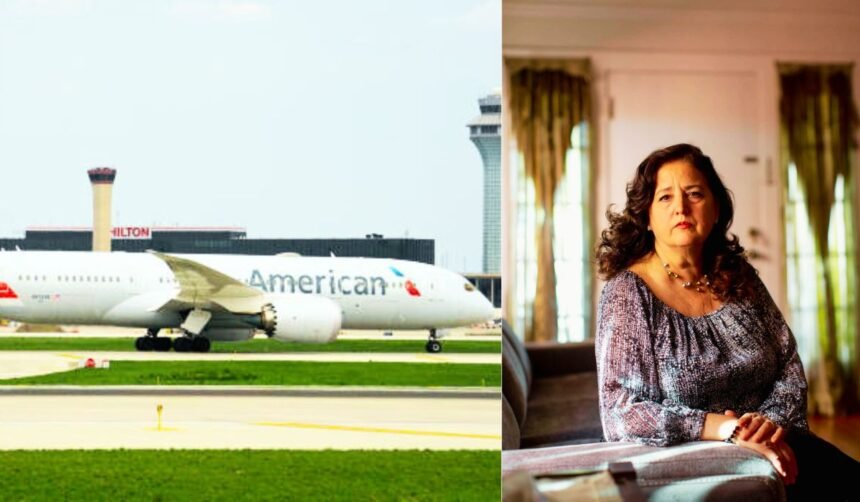A California jury has ruled that clothing manufacturer Twin Hill and its former parent company, Tailored Brands, should pay more than $1 million in damages to four American Airlines flight attendants who claimed their work uniforms made them ill.
The verdict was reached last week at the Alameda County Superior Court after years of legal battles between the flight attendants and the uniform suppliers. Although the judge has yet to formally approve the jury’s decision, an attorney for the plaintiffs called it a mere technicality.
Flight Attendants First Filed Lawsuit in 2017
The case was first brought in 2017 by a group of American Airlines flight attendants, including 37-year veteran Tracey Silver-Charan. The lawsuit alleged that formaldehyde used on the Twin Hill uniforms to reduce wrinkling caused skin rashes, respiratory distress, and other health issues.
In 2016, Twin Hill had supplied about 1.4 million garments and accessories to over 65,000 American Airlines employees. Within months of wearing the new uniforms, Silver-Charan and others began experiencing violent illness at work, including fainting spells, bronchitis, and laryngitis.
Strangely, their symptoms would subside when they returned home after shifts. The pattern led Silver-Charan to suspect the uniforms were to blame. She and other flight attendants notified supervisors and requested different uniforms, but American Airlines insisted they keep wearing the Twin Hill gear.
New Uniforms UsedDespite Health Complaints
Even after thousands of employees reported adverse reactions, including migraines, hives, and thyroid dysfunction, the airline continued using the Twin Hill uniforms.
Although American Airlines eventually terminated their contract with Twin Hill, flight attendants claim the damage was already done.
Jury Finds Uniforms Harmed Plaintiffs
In its verdict last week, the jury agreed the uniforms were a “substantial factor” in harming the four plaintiffs, who were awarded individual sums ranging from $130,000 to $750,000.
Silver-Charan received $320,000, while Brenda Sabbatino was granted the largest settlement of $750,000. According to reports, Sabbatino was forced into early retirement due to severe chemical sensitivities caused by the uniforms.
Attorney Hopes Verdict Sends Message
Daniel Balaban, an attorney representing the flight attendants, said he hopes the verdict motivates Twin Hill and its insurers to resolve the hundreds of similar outstanding claims.
“If they’re not, we’re going to try these cases one batch at a time,” Balaban told the Washington Post.
While the jury did not find Twin Hill negligent in designing the uniforms or failing to recall them, Balaban said his clients are satisfied with holding the company financially accountable for their damages.
“Hopefully, it sends a message to the defendant and insurance companies to try to resolve these cases,” he added.
AA Flight Attendants Still Suffer Effects
For many American Airlines crew members like Silver-Charan, the effects of the toxic uniforms still linger years later.
Silver-Charan took six months of unpaid medical leave after developing severe chemical sensitivities from the uniforms. When she returned to work, the airline allowed her to wear her old uniform.
But her health issues continued whenever she worked near staffers wearing the Twin Hill gear. She suffered from constantly watery eyes and recurring bronchitis that left her unable to work.
Despite notifying her superiors of these ongoing problems, American Airlines eventually terminated Silver-Charan after her illnesses prevented her from completing required training.
Victims Hope Verdict Leads to Change
While money can help compensate for lost wages and medical expenses, the plaintiffs hope their case leads to real change in the airline industry.
Sabbatino wants airlines to take responsibility for uniform-related illnesses and provide compensation for affected employees. Her health deteriorated so quickly after wearing the Twin Hill uniforms that she had no choice but to take an early retirement from her decades-long career.
Silver-Charan similarly wants airlines to acknowledge they have a duty to protect the health and safety of flight crews. After 37 years of loyal service, she feels American Airlines discarded her instead of addressing the issues caused by the faulty uniforms.
The plaintiffs also aim to spur more oversight and reform around chemicals used in clothing manufacture. Tighter regulations could prevent future airline workers from suffering similar consequences from toxic uniforms.
For now, the flight attendants look forward to getting their lives back on track after the years-long ordeal finally resulted in a measure of justice.



